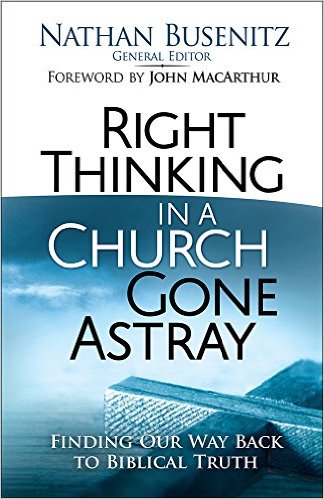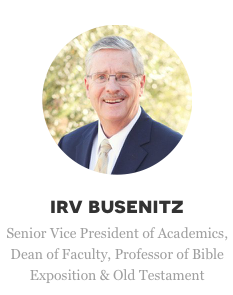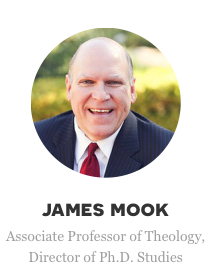 The church has gone astray. That much may be said,hopefully, without much need for substantive discussion. But if you’re somewhat reluctant to wholeheartedly accept this notion, let the Foreword to Right Thinking In A Church Gone Astray perhaps persuade you.
The church has gone astray. That much may be said,hopefully, without much need for substantive discussion. But if you’re somewhat reluctant to wholeheartedly accept this notion, let the Foreword to Right Thinking In A Church Gone Astray perhaps persuade you.
“If there were ever a time when the church needs to distinguish itself from the world, standing firm in its commitment to biblical truth and sound doctrine, this is that time. Rather than succumbing to secular pressures, or camouflaging itself to blend in with the world, the church ought to be boldly shining the light of the gospel into the kingdom of darkness.” John MacArthur
If you lift your eyes to gaze at what much of the church has become, it’s hard not to see what MacArthur sees. The pressures to comply with the increasing worldliness of the culture around us should find the church not contemplating how to fit in with that culture, but how to intentionally, biblically, distinguish itself from it. Rather than yield to a presumed biblical, but false, notion of unconditional and indiscriminate love, the church must show love conditioned upon the very discriminating Gospel of our Lord.
MacArthur affirms the need for intentional unconformity. “Now is not the time for compromise, but for courage and conviction.” That courage must be born of faith and that conviction must be fixated in the Word of God. But the contemporary church often doesn’t reflect much of this.
“Too many preachers are more concerned with being popular than with rightly dividing the Word of Truth. Too many Christian universities care more about federal funding than they do about upholding biblical morality. Too many seminaries are abandoning their evangelical heritage to maintain a facade of intellectual respectability. And too many churches are nothing more than glorified youth events, designed to draw a crowd but devoid of the biblical qualities than define a church.” John MacArthur
“In many ways,” continues MacArthur, “ the evangelical church has gone astray.”
It is with this readily understood condition of demise in mind -what Spurgeon called, in his day, the “downgrade” – that Nathan Busenitz, as general editor, has compiled this highly recommended book. Busentiz rounds out the dozen total contributors to the text that addresses the glaring issues facing the church, providing Scripturally sound responses to areas where the temptation to compromise is most prevalent. The contributors include William Barrick, Michael Mahoney, Alex Montoya, Irv Busenitz, James Mook, Abner Chou, Tom Patton, Carl Hargrove, Michael Riccardi, Jesse Johnson, and Mark Tatlock.
The book, 248 pages in length, is divided into three sections: The Church and Contemporary Issues, The Church and Sound Doctrine, and The Church and The Great Commission. A very useful appendix includes a Topical Reference Guide that provides a Scriptural jump-start for study of the key issues highlighted in the book. A thorough Notes section is provided for citations by chapter with commentary expanded upon as necessary from the cited sources.
Section I includes five chapters, beginning with “When The Church Goes Astray,” written by Nathan Busenitz. This introductory chapter, subtitled “Evangelicalism’s Misguided Quest for Popularity and Prestige,” highlights the foundational, but oft-avoided, truth that “God measures success not in terms of popularity or numbers, but in terms of faithfulness to Him.” Yet the church, failing to focus on faithfulness, has instead vigorously pursued “evangelical influence” for itself. As Busenitz points out, if that “means influence for the gospel, it represents a positive development. But when evangelicals become so focused on gaining academic prestige, political clout, or cultural popularity that they compromise the purity of the gospel in the process, then the quest for influence inevitably leads to disaster.”
Busenitz. This introductory chapter, subtitled “Evangelicalism’s Misguided Quest for Popularity and Prestige,” highlights the foundational, but oft-avoided, truth that “God measures success not in terms of popularity or numbers, but in terms of faithfulness to Him.” Yet the church, failing to focus on faithfulness, has instead vigorously pursued “evangelical influence” for itself. As Busenitz points out, if that “means influence for the gospel, it represents a positive development. But when evangelicals become so focused on gaining academic prestige, political clout, or cultural popularity that they compromise the purity of the gospel in the process, then the quest for influence inevitably leads to disaster.”
In snapshots of the three arenas of academics, politics, and culture, a preeminent example of the church’s prioritizing of influence over faithfulness is featured for each. The academic arena features the forsaken threshold of Biblical authority to instead pursue prestige within the scholastic world and influence among the intellectuals. Such a pursuit necessitated softening views on doctrine and the accommodation of human reason to a position that placed it, if not above, at least equal to the authority of Scripture. As Busenitz observes, “When evangelicals prioritize popular influence over biblical faithfulness, they inevitably find themselves abandoning historic evangelical principles (like the inerrancy of Scripture) for the sake of academic respectability.” (Emphasis original) This jettisoning of the authority of Scripture effectively undergirds the overall problem with the modern church and is a consistent theme which the book highlights and to which it responds.
The chapter’s look at the church’s desire for political influence highlights the spirit of ecumenism rife in much of the evangelical church. “Evangelicals have partnered with Roman Catholics, Mormons, and other aberrant groups in order to gain political influence. In so doing, they have sacrificed the clarity and integrity of the eternal gospel on the altar of temporary political gain.”
This evident straining for influence is perhaps felt in no arena more than that of cultural relevance. But, Busenitz writes, “problems arise when that desire for influence overrides the commitment to gospel faithfulness.” The glaring example provided for this? Billy Graham. “Graham’s desire for greater evangelistic influence was noble, but it crossed the lines of compromise when he began to partner with those who denied the true gospel.”
Many pew-sitting believers may bristle at such criticism of the evangelically-hallowed Graham, but his flagrant willingness to involve liberal Protestants (who expressly deny fundamental tenets of infallibility and inerrancy of the Scripture) and Roman Catholics in his crusades is prime evidence of the sacrifice of the Gospel for the presumed benefit of influence. Citing Iain Murray from his stellar work Evangelicalism Divided, Busenitz excerpts the following:
“The reason why BGEA [Billy Graham Evangelistic Association] decided to cooperate with liberals and other non-evangelicals was never set out in terms of principle. The fact is that the policy was seen as a necessary expedient designed sincerely for the best end, namely to gain a wider hearing for the gospel. Crusades depended upon crowds and in the Graham story there is an almost ever-present concern for maintaining and increasing numbers.” Iain Murray
Of course, the likely result of such an emphasis on numeric influence rather than Gospel faithfulness is obvious. “Greater influence, in terms of larger numbers of people, was so heavily prioritized that Grahams’ commitment to gospel purity began to erode.” It eventually led Graham to “affirm fellow Roman Catholics as Christians, and to say things that sounded almost universalistic,” referencing Graham’s 1997 interview with Robert Schuller in which he said:
“[God] is calling people out of the world for his name, whether they come from the Muslim world, or the Buddhist world, or the non-believing world, they are members of the Body of Christ because they have been called by God. They may not know the name of Jesus but they know in their hearts they need something they do not have, and they turn to the only light they have, and I think that they are saved and they are going to be with us in heaven.” Billy Graham
Gospel exclusivity would not be a fundamental abdicated by Graham alone. By the turn of the millennium, the crusade mentality and the presumed noble covetousness for ever larger crowds found evangelicalism turning to “the market-based methodologies of the seeker-driven church.” But, as within the lust for influence in academia and politics, this trend equally demanded that “the lines of gospel exclusivity” would be erased. Also contributing to Scriptural demise, though a short-lived phenomenon, the “emerging church” movement would leave “in its wake a wave of enthusiasm for ‘contextualized’ approaches to ministry.”
The four remaining chapters in Section I of the book each deal with a significant contemporary issue facing the modern church. Tom Patton writes the chapter “Rock-Star Religion” which counters the “church’s celebrity culture.” William Barrick, in “The Crescent and the Cross” chapter, writes on how to engage Muslims “for the sake of the Gospel.” Chapter Four, by Alex Montoya provides a well-crafted chapter, “When Truth Meets Love,” offering a Biblically sound, loving response to the issue of homosexuality. Finally, Jesse Johnson revisits the bestselling book that remains a major influencer in the church with “Is This Jesus Calling?”
Section II of Right Thinking In A Church Gone Astray allots five core chapters to a focus on “The Church and Sound Doctrine.” Such a subtle, central presentation in the book serves as a reminder that the church must be, at its core, fixated on the sound doctrine presented in Scripture or it will be unable, perhaps unwilling, to address the many issues facing it in a Biblically obedient, faithful way.
The section opens with an appropriate focus on “the truth that Jesus Christ is the head of the church.” Michael Mahoney, writing the chapter “Who’s In Charge of Your Church,” rightly identifies Christ’s headship of the church as “an essential doctrine.” He writes that “Though most in the modern church would pay lip service to the absolute authority of Christ, many fail to reflect that truth in they way they approach life and ministry.”
Sadly, but readily visible to the evangelical onlooker, “the church is in need of an intensive and rigorous battle to recapture the glorious truth of the headship of Christ.” Though the authority of Christ is an aberrant notion to the world, the church cannot reject this and remain faithful. “Yet sadly, much of evangelicalism has largely abandoned this doctrine.” How is this doctrinal diminishment seen? It is, writes Mahoney, “an abandonment seen , first and foremost, in how many churches treat the Word of God.”
“Rather than looking to Scripture to define their approach to ministry, they rely on demographic surveys and market-driven strategies. Instead of boldly expositing biblical truth, they seek to entertain and amuse in order to draw a crowd. Rather than resting in the sufficiency of Scripture, they look for words from God outside His written Word. Whenever and wherever the Word of Christ is diminished or disregarded, it evidences a lack of submission to Christ Himself.” Michael Mahoney

Abner Chou, in the next chapter, picks up on this theme. Titled “Nothing But the Truth,” Chou writes on the necessity of the doctrine of inerrancy, and points out “why we cannot compromise our commitment to Scripture.” The chapter provides a refreshing defense, not merely of the doctrine of inerrancy, but how this core belief has implications for how the believer and the church think and act. Chou gives a woefully needed call for “recovering Christian thinking” based on “Scripture alone” because it “is our authoritative standard because it is the truth.” The firm footing in inerrant Scriptural truth is necessary because of the abundance of false teaching. “We cannot be apathetic on the issue of engaging error and defending the truth,” writes Chou. “The gospel is always at stake.”
The perpetual assault of error launched at the church, and often tolerated within it, demands that the church be able to distinguish doctrinal confusion from outright false teaching that represents “damnable heresies.” Michael Riccardi provides a chapter, “The Hallmarks of Heresy,” that lays out the necessary discernment to distinguish heresies from “doctrinal confusion.” His synopsis of fundamental doctrines in the areas of soteriology , theology proper, Christology, Pneumatology, the doctrine of the Trinity, and Bibliology serve to provide an instructive framework for individual believers and the collective church to rightly discern often frequent, but correctible error from certain, damnable heresy.
The final two chapters of Section II, penned by Busenitz, address, respectively, “The Charismatic Question” and the critical need for church leaders to “care about Church History.” These two areas find Busenitz a most capable guide. His commentary on charismatic gifting is presented by answering three rhetorical questions – What? When? Why? His responses are firmly fixed with Scriptural teaching and serve to capably bolster the historic orthodox position of cessationism in light of the relatively recent (in the scope of church history) appearance of the “gifts.” With regards to church history, Busenitz, who serves as Dean of Faculty at Masters Seminary, also teaches Church History at the seminary. Referencing the instruction Busenitz gives in his Historical Theology class, the book features “ten reasons why the study of church history matters.”
The concluding section of Right Thinking In A Church Gone Astray focuses on “The Church and the Great Commission,” and includes chapter contributions by Irv Busenitz, Jesse Johnson, Carl Hargrove, Mark Tatlock, and James Mook.
The chapter “To The Ends of The Earth,” written by Irv Busenitz, opens with “Cover to cover, the Bible is a missionary story.” As both the beneficiaries and stewards of the Gospel, the Lord’s instruction from Matthew 28:19 to “go therefore and make disciples of all nations” is the “evangelistic priority” of the church. When it loses that priority, “they stray from the primary mission God has called them to accomplish on this earth.” The chapter instructively outlines a Scripture-centric understanding of God’s redemptive agenda with which the church must be engaged and to which it must be obedient.
Jesse Johnson contributes the exceedingly helpful chapter entitled “Compassion Without Compromise” that carries the subtitle, “Thinking about Social Justice in Light of the Great Commission.” Believers today often see the contemporary church zealously engaged in social justice efforts, but may not realize that in many (if not most) cases these efforts are not biblically grounded. “When the Bible speaks about justice in a society,” writes Johnson, “it is never about outcomes, but about process .” He points out that “The Bible is concerned with justice in the true sense as defined by God, but not with what contemporary culture commonly labels as social justice.”
Johnson’s chapter properly sets the pursuit of social justice against the Great Commission given the church. “Make no mistake – appeals to pursue social justice ends through ecclesiastical means are often in conflict with the Great Commission.” (Emphasis original) In addressing specific issues such as poverty, slavery, and abortion, Johnson frames a response around the fundamental Biblical understanding that “the church does not have an earthly agenda, but a heavenly one.”
Carl Hargrove, contributing “Fit For The Master’s Use,” takes up the unpleasant reality of the “damage to the church’s gospel witness” prompted by “moral failure in the lives of Christians, and especially Christian leaders.” He writes that “proclaiming the Gospel from a platform of personal piety” – in both life and doctrine – “is of paramount importance.” Though piety is a word infrequently used today, it is a helpful one. “It speaks of godliness, devotion, purity, holiness, spiritual discipline, and heavenly mindedness.” Hargrove outlines the Biblical characteristics of piety, why it is so desperately needed in the church today, and how piety can be pursued and practiced. He also provides a helpful “Self-evaluation” in a series of questions to help “evaluate your personal piety.”

Shifting from personal holiness in light of the Great Commission, the book next finds Mark Tatlock, President of The Masters Academy International, addressing the collective efforts of evangelical missions with a chapter called “Global Risk Assessment.” The opening to the chapter reads:
“In order to fulfill the Great Commission, the church must send out workers into the harvest. Often, local churches have entrusted these workers to missions agencies, who oversee the sending process and supervise missionary work on the field. But unbeknown to many congregations, a number of dangerous trends are threatening the integrity of evangelical missions agencies. These trends need to be recognized so that church leaders can provide sound counsel to potential missionaries while also investing wisely in missions activities.” Mark Tatlock
Just ask the obvious question. In light of the egregious doctrinal laxness of the modern American church, in light of the often false gospel message proclaimed by the popular, superficial church, what exactly are missionaries from American churches preaching and teaching? Is it likely that a more Biblically-faithful gospel is being proclaimed? Is it likely that the Word is being more rightly handled and sound doctrine more strenuously advanced?
This chapter serves as a wake-up call for American pew-sitters and local pastors who have often remained out of the loop of hands-on missions oversight by utilizing third-party – including denominational – missions agencies. Tatlock outlines five worrisome, Gospel-diluting, Word-diminishing trends facing contemporary global missions.
“Trend #1: Liberalization of International Theological Education
Trend # 2: Hyper-Contextualization
Trend # 3: Expedited Bible Translation
Trend # 4: Rapid Church Planting Movements
Trend # 5: Post-colonialism”
In giving a synopsis of each trending danger, the book provides a thorough list of “recommendations to affirm Biblical missions efforts” that serve as a foundation for properly, Biblically addressing the trends to correct them presently, and, hopefully, preclude their recurrence.
The book’s concluding chapter is “To The Praise of His Glory,” a suitable conclusion that reminds believers to “remember the church’s ultimate  priority.” James Mook writes a refreshing encouragement of this “highest priority.” “God has eternally ordained the church to glorify Him.” While market-driven, seeker-sensitive approaches to church emphasize methods that appeal to the target audience, Scripture presents a very different purpose – “To Glorify God.”
priority.” James Mook writes a refreshing encouragement of this “highest priority.” “God has eternally ordained the church to glorify Him.” While market-driven, seeker-sensitive approaches to church emphasize methods that appeal to the target audience, Scripture presents a very different purpose – “To Glorify God.”
Mook cites the wonderful 1765 work by Jonathon Edwards, The End For Which God Created The World, to emphasize that, “As His creatures, the praise of the glory of God is our chief end.” An encouraging outline of truths from Edwards’ Word-drawn work speaks to the supreme doctrine of God’s sovereignty, a doctrine that yields unending truths for the believer and which serves as the fundamental source of our abiding assurance. As Mook concludes, he writes “let us cast our eyes on Him in Scripture. Let us become increasingly God-focused by seeking to know Him as He has revealed Himself in His Word … so that for all of eternity we might live to the praise of His glory.”
Right Thinking In A Church Gone Astray is a much needed and valuable resource for contemporary believers. It is a must-read. Though each chapter provides content that could be a book unto itself, Right Thinking helps accomplish the ambition of it’s subtitle, “Finding Our Way Back To Biblical Truth.” It does this by highlighting the concerning errors of much of the contemporary church, gives guidance on how to correct those errors in light of Scriptural doctrine, and it serves to encourage the church to be about its purpose of stewarding the Gospel in an ever-darkening world. Right Thinking In A Church Gone Astray calls the church to intentionally, Biblically “think on these things” so that it does not lose sight of its greatest call – faithfulness to the God who saved us and rightly commands our due, eternal praise.
Available on Amazon, from ChristianBook.com and other booksellers.
[Contributed by Bud Ahlheim]









